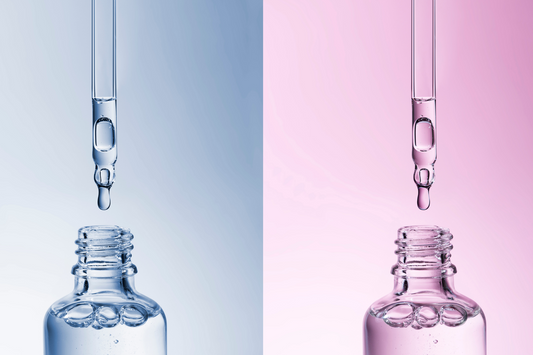Losing weight is a significant achievement if that's your goal, but if you’re losing hair in the process, it’s not as much of a celebration. Hair loss and weight loss go hand-in-hand sometimes, and it's essential to know why.
Revealing the cause of your hair loss helps you understand how to treat it and whether or not you should see a healthcare professional. Here’s what you should know.
What Causes Hair Loss?
Hair loss, also known as telogen effluvium, occurs for many reasons, including weight loss. This type of hair loss is temporary and happens after weight loss surgery due to stress or a restrictive diet, which can lead to nutrient deficiencies.
Telogen effluvium is common. Following rapid weight loss, hair loss may begin at the three or four month mark, and may last for up to six months.
During this stage of hair loss, much more hair is lost than the average daily amount of 50 to 100 strands. The body must adjust to the hormonal and other changes it incurred, so it may take up to six to nine months to stop.
There are several reasons why telogen effluvium occurs:
- Rapid weight loss, weight loss surgery, or crash diets
- High stress levels
- Surgery
- High fever
- Childbirth
- Stopping birth control
- Nutritional deficiencies
What Are the Stages of the Hair Growth and Hair Loss Cycle?
Healthy hair shaft formation and follicle health depend on your body’s wellness and proper dietary nutrition. Fatty acids, selenium, iron, vitamin D, and zinc deficiencies may also contribute to hair loss.
Your hair shaft undergoes three changes during its lifetime. Each phase leads to the next and serves a purpose in the growth cycle. The three phases of hair growth are:
1. The Anagen Phase: Growth Phase
The anagen phase of hair growth is the very first phase. In this phase, the hair follicle forms a new hair shaft, and most of the hair on your scalp, 90%, is in the growing anagen phase at one time. This phase lasts between two to six years.
The amount of time that a hair follicle remains in the anagen phase is determined by genetics. This genetic aspect explains why some people can grow long hair and others cannot. The anagen phase ends when a signal causes the follicle to transition to the catagen phase.
2. The Catagen Phase: Transition Phase
The catagen phase is a transitional change that occurs after the anagen phase. The hair follicles shrink, hair growth slows, and the hair begins to separate from the hair follicle. The transition takes about one to two weeks, and only 1% of your hair is in this phase at one time.
3. The Telogen Phase: Resting Phase
The telogen phase is a three to four month resting or sleeping phase during which some of your hair falls out. When you lose hair, a new hair is already on board in the follicle. The new hair begins to grow in, and the growing cycle repeats. Losing up to 100 hairs per day is normal.
Stress causes the body to trigger the hairs to stop growing, so they enter the catagen phase too early, leading them to fall out prematurely and enter the telogen phase.
How Does Weight Loss Surgery Affect Hair Loss?
Weight reduction surgery causes rapid weight loss. The restricted diet that follows the weight loss surgery causes additional weight loss, and this restriction and sudden lifestyle change can cause nutritional deficiencies within the body.
A study performed on 112 women in 2021 found that 75% of the women who underwent gastric sleeve surgery experienced hair loss. 80% of these women reported that their hair loss began three to four months post surgery.
Is Hair Loss Dangerous?
Telogen stage hair loss due to weight loss surgery is not harmful. Your body needs time to adjust to the stress and nutritional changes it is experiencing, so hair growth usually resumes within a few months.
Hair Loss and Nutritional Deficiencies
Nutritional deficiencies, like vitamin or mineral deficiencies, due to rapid weight loss, however, can be dangerous. An example of this would be a deficiency in either vitamin D or iron. Iron deficiency anemia has severe complications if left untreated.
Anemia can lead to:
- Heart problems
- Developmental issues
- Depression
- Infections
- Pregnancy complications
Malnutrition has its own set of serious complications such as stomach issues, muscle loss, anxiety, and immune suppression. Contact your doctor if you have health concerns or questions regarding these conditions.
How Can I Treat Hair Loss?
Proper nutrition can aid the prevention and treatment of hair loss resulting from rapid weight loss. Maintaining a balanced diet helps stave off vitamin and mineral imbalances and deficiencies that lead to hair loss.
If you are unsure of your daily dietary allowances, contact your healthcare provider or dietician to determine your personalized amounts. Height and weight proportions usually determine nutritional guidelines for each person.
Eat a Healthy Diet
Incorporating daily foods rich in iron and zinc is always helpful to prevent hair loss. Foods such as shellfish, dairy, quinoa, spinach, legumes, cashews, and broccoli are excellent dietary choices. A healthy diet, along with adequate water consumption and exercise, leads to a healthier, happier you.
Try a Follicle-Focused Hair Serum
Hair serums such as Revela’s Hair Revival Serum are scientifically designed to help you control hair thinning and hair loss.
This hair serum is clinically tested to target the hair follicle, reactivating and nourishing roots to reawaken them for a fuller appearance and ultimately, luscious hair. The serum uses ProCelinyl™, a breakthrough discovery in hair science, to target hair loss and thinning from stress, genetics, and hormones.
The Hair Revival Serum includes the following ingredients:
- Caffeine: Caffeine supports the sleeping hair follicles and promotes thicker-looking hair through microcirculation.
- Saw Palmetto: Saw Palmetto may help inhibit the production of dihydrotestosterone (DHT).
- Glycerin: Glycerin moisturizes the hair and skin, increases hydration, and refreshes the skin’s surface. It also nourishes dry skin.
- Aloe Vera: Aloe vera is nourishing, healing, and moisturizing, and it contains vitamins, amino acids, and minerals. It nourishes and moisturizes the skin on the scalp.
- Pantothenic Acid: Pantothenic acid, also known more commonly as vitamin B5, and it is essential for metabolism. Pantothenic acid is a precursor to coenzyme A.
Hair loss that results from weight loss is very common, and Revela realizes that. Revela’s Hair Revival Serum works to rejuvenate the hair follicle and provide nutrients that encourage healthier-looking hair.
Hair Loss and Weight Loss: The Bottom Line
Losing your hair after losing weight is common, but that doesn’t make it feel any less frustrating. Hair loss generally occurs three months after weight loss, so it may be difficult to pinpoint whether it's the weight loss or something else causing your telogen effluvium.
Nutrient deficiencies and stress may be the causes of this hair loss, but it usually resolves itself within six months. Increasing iron, vitamin D, zinc, and other vitamins and minerals may help prevent or nix hair loss. Talk to your healthcare provider before starting any diet.
Revela is here to make your hair journey a little simpler. It is free of toxins and harmful side effects, leaving you with nourished-looking hair you’re guaranteed to love.
Sources:
Do you have hair loss or hair shedding? | American Academy of Dermatology
Diet and hair loss: effects of nutrient deficiency and supplement use | NCBI





